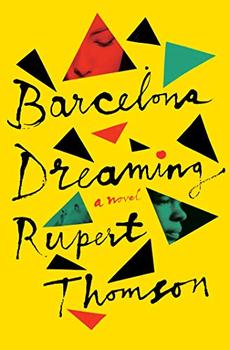Summary | Excerpt | Reviews | Beyond the Book | Readalikes | Genres & Themes | Author Bio

THE GIANT OF SARRIÀ
When I was twenty-one, I fell in love with Pol. I moved to Barcelona to be close to him, and we married soon after. Within a year of our wedding I was pregnant, but things had already started to go wrong between us, and by the time our daughter was six months old we had split up and were living apart. Though I was from the North of England, I stayed on in Barcelona. I couldn't bear to leave. The quality of the light first thing in the morning, so bright and clear that the buildings seemed to have black edges. The green parrots that flashed from one palm tree to another. Long walks in the Collserola in April, to gather wild asparagus, or in September, to hunt for mushrooms. The beach every weekend in the summer, the mountains in the winter—and restaurants and bars that stayed open all night. It was a city whose pleasures were simple and constant—and it was a good place to raise a child.
For the first few years, I taught at an international school in Pedralbes, but I'd always dreamed of running a business of my own. It wasn't until my daughter, Mar, was in her early teens that I had the money—I came into a small inheritance— and not long afterwards I found a commercial property that I thought might work: two rooms and a backyard in Sarrià, an ancient, well-heeled area in the upper reaches of the city. I called the shop Trinket. The cheekiness of the word appealed to me. Though English, it had a Catalan ring to it. That abruptness at the end. The sudden, final consonant. When I first saw the name printed in gold script on the crimson banner that would hang outside, it perfectly described the kind of place I'd had in mind—an Aladdin's cave of unexpected and exotic treasures.
Mar decided to go to university in England. She wanted to explore her English roots, she said. By then I'd been running Trinket for five years. I wasn't making much of a profit, but I got by, and during her second year at Bristol I moved to a new apartment only a few minutes' walk from the shop. Both the main bedroom and the living room had sliding glass doors that gave onto an east-facing terrace, where there was enough room for a Marquesa plant, a small lemon tree, and several pots of red geraniums. Directly beneath me was an underground car park, with frosted-glass slats high on the back wall that were left open all year-round. If I was sitting in my living room with no TV or music on, I would hear car engines starting, or people talking on their phones. Once, a man cleared his throat, and I thought for a moment that there was someone else in the apartment. At first, this was all a bit unnerving. In time, though, I adjusted. Like the shudder of the fridge or the distant grinding of the lift, the noises even began to reassure me.
I had been living there for about eighteen months when I was woken in the night by the sound of someone crying. It seemed to be coming from below. I eased out of bed and stepped onto the terrace. It was a stifling, humid night in late July, and I could smell the jasmine that sprawled over the side wall of the building that stood opposite. Beneath it, as always in the summer, was the stale, slightly medieval smell of drains. The crying was quieter now, and yet persistent, as if the misery ran deep. It sounded more like a man, I thought, than a woman. Back inside, I pulled on a denim skirt and a T-shirt, then I picked up my keys and left the apartment.
When I reached the entrance to the car park, I felt a shiver of apprehension, but I shook it off and started down the concrete slope. At the bottom was a kind of cabin or kiosk. The man on duty most nights was a melancholy Venezuelan called Hector. He almost always brought his Alsatian, Rocky, to work with him. For companionship, he told me, rather than security. After all, Sarrià wasn't exactly dangerous. I peered through the window. On the desk were a Styrofoam cup of coffee, still half-full, and a copy of Mundo Deportivo. There was no sign of Hector. Perhaps he had heard the crying himself, and had gone off to investigate. Or perhaps he had taken Rocky for a walk. There was a special sandy area for dogs about three hundred meters away, on the other side of Avinguda Foix.
Excerpted from Barcelona Dreaming by Rupert Thomson. Copyright © 2021 by Rupert Thomson. Excerpted by permission of Other Press. All rights reserved. No part of this excerpt may be reproduced or reprinted without permission in writing from the publisher.
To limit the press is to insult a nation; to prohibit reading of certain books is to declare the inhabitants to be ...
Click Here to find out who said this, as well as discovering other famous literary quotes!
Your guide toexceptional books
BookBrowse seeks out and recommends the best in contemporary fiction and nonfiction—books that not only engage and entertain but also deepen our understanding of ourselves and the world around us.